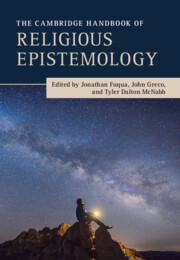Book contents
- The Cambridge Handbook of Religious Epistemology
- Cambridge Handbooks in Philosophy
- The Cambridge Handbook of Religious Epistemology
- Copyright page
- Contents
- Tables
- Contributors
- Introduction
- Part I Faith and Rationality
- Part II Religious Traditions
- Part III New Directions
- 13 Trust, Testimony, and Religious Belief
- 14 Religious Disagreement
- 15 Franciscan Knowledge
- 16 Liturgically Infused Practical Understanding
- 17 Knowledge-First Epistemology and Religious Belief
- 18 Epistemic Disjunctivism and Religious Knowledge
- 19 Debunking Arguments and Religious Belief
- References
- Index
17 - Knowledge-First Epistemology and Religious Belief
from Part III - New Directions
Published online by Cambridge University Press: 24 August 2023
- The Cambridge Handbook of Religious Epistemology
- Cambridge Handbooks in Philosophy
- The Cambridge Handbook of Religious Epistemology
- Copyright page
- Contents
- Tables
- Contributors
- Introduction
- Part I Faith and Rationality
- Part II Religious Traditions
- Part III New Directions
- 13 Trust, Testimony, and Religious Belief
- 14 Religious Disagreement
- 15 Franciscan Knowledge
- 16 Liturgically Infused Practical Understanding
- 17 Knowledge-First Epistemology and Religious Belief
- 18 Epistemic Disjunctivism and Religious Knowledge
- 19 Debunking Arguments and Religious Belief
- References
- Index
Summary
Knowledge-first epistemology gives up the traditional project of defining knowledge in terms of necessary, sufficient, and informative conditions. Rather, the approach gives knowledge itself explanatory primacy within epistemology. This chapter explores two ideas that have been prominent among knowledge-first authors and considers their implications for religious epistemology. The first is to equate one’s evidence with one’s knowledge, or with some relevant subset of one’s knowledge. The second is to reverse the traditional order of explanation between knowledge and justified belief; that is, to explain justification in terms of knowledge rather than the other way around. These ideas, we argue, have interesting implications for a variety of issues in religious epistemology, including the nature of evidence (and defeating evidence) for theism, and the prospects for Public Reason Liberalism.
Keywords
- Type
- Chapter
- Information
- The Cambridge Handbook of Religious Epistemology , pp. 257 - 272Publisher: Cambridge University PressPrint publication year: 2023
- 1
- Cited by

